- Home
- Courtney Milan
Seductive Starts Page 9
Seductive Starts Read online
Page 9
Again. Again. She rose up on him to press once more, and the head of his member pushed into place. She opened her eyes to regard him. His hand found hers; their fingers tangled.
He didn’t say anything. He didn’t have to. Her limbs seemed to melt. She could not hold herself in place, poised as she was.
And so she let go, relaxing the muscles that held her over him. She simply let herself sink onto his length. He was so big inside her. But the sensation wasn’t unpleasant. It was…lovely.
She was safe. Safe to simply experience the hardness of him, the stretch of her body, the growing pulse of her desire. It was safe to want—to rise up on her knees and then engulf him once more.
Their eyes met as she did; he let out a breath, long and deep, and his hands clenched around hers.
Her body knew what to do without any need for instruction. Deep instinct led her to grind against his pelvis, to search out the right rhythm, the right friction. She lost herself in the feel of them—in the subtle satisfaction that swept over her at the look on his face as she moved faster.
“You lovely thing,” he growled.
Passion built until it became an immense pressure, demanding release. She tried and tried, but no matter how she reached for it, it eluded her. Just when her want hit the edge of splintering frustration, he slid his hand between her legs and stroked her right where she needed it.
His touch was sure and unerring. The heat that had built released all at once, an inferno engulfing her from head to toe. She lost sight of everything but the pleasure that raged through her.
And then, when the whirlwind had passed, his hands fell on her hips and he drove into her from beneath, hammering home the echoes of her pleasure with his own. He let out a hoarse cry while she was still shuddering in the aftermath of her orgasm.
They sank to the mattress afterward. His arms came around her, warm and comforting. This was right—precisely what she’d needed.
He cupped her cheek.
It was a moment of precious, perfect togetherness. No wonder they referred to the act as intimacy. She had never felt so closely entangled with anyone before. His breaths were hers. His body…
She opened her eyes and looked into his dark gaze.
He wasn’t smiling at her. If anything, his intensity had grown. “There now,” he said softly. “Now you understand why I didn’t want to consummate the marriage.”
Chapter Nine
SHE HAD BEEN ALMOST LIQUID, molded against Hugo’s chest. But he had no sooner spoken then all the tension crept back into her limbs. She stiffened atop him, then pulled away.
“Hugo. It doesn’t have to be—”
He set his fingers across her lips before she could give voice to his deepest wants. “It does.”
“That meant something to you. Something real.”
“Of course it did.” He sat up and took her hand. “I won’t tell falsehoods about this. What we have is a species of love.”
She let out a breath in surprise.
“A transitory, short-lived one,” he explained. “A perfect sunrise—seen once, remembered always. Never duplicated.”
“Never duplicated?” Her fingers bit into his. “Why ever not?”
“Because tomorrow you’ll go to your farm. And I—”
“It doesn’t have to be that way.” Her hair was in wild, chestnut disarray around her shoulders and her eyes were wide and gray.
Hugo moved a lock of her hair aside. “You can’t stay with me, Serena.” His words sounded harsh. “Recall who I work for.”
She blanched, but hesitated only a moment before raising her chin. “You could—”
“I could what? Come with you? I suppose I could, at that. But I won’t. I have five hundred pounds waiting on the outcome of this affair with the duke. That’s the only chance a pugilist like me has to come into that much money. With that, I can truly become someone. If I go with you—”
“You are someone.” She frowned.
You’ll never amount to anything. Hugo let out a breath. “Not enough.”
“You are. Hugo, if you’d only—”
“It’s not enough,” he repeated grimly. He pushed away from her and swung his feet over the edge of the bed. “Do you hear? It’s not enough for me.”
“Not enough what?”
Such a reasonable question.
“Because you’re intelligent and successful,” Serena was saying, “and you’re a good man. That thing with the pins—it was lovely. You have a way of putting me at ease.”
“That’s nothing,” he said. “My mother was always doing things like that for me. She gave me a magic rock when I was young, and told me if I slept with it under my pillow, nothing would happen on the next day that I couldn’t bear.”
Beside him, Serena sucked in a breath. But he wasn’t ashamed of telling her the truth. He had suffered through days that had made him doubt his mother’s stone.
He brushed those memories away. “When I was older, she took an old pickle jar to the park. She told me to fill it with all the most important things. Then she buried it deep, deep, where my father couldn’t find it no matter what he did.”
It had been drizzling, but he’d scarcely felt the wet.
Do you have a jar, Mama?
She’d smiled and shook her head.
We should make one for you.
Her smile had fixed in place. Then she’d let out a sigh. I’ve buried too many children, she’d finally said. I’m not burying anything else that matters. Never again.
“Your mother sounds like a lovely woman,” Serena said beside him.
“My mother told me I would be somebody.” It had been reflexive soothing on her part—sheer contradiction after his father’s tirades.
“Maybe you should listen to her.”
You can be anyone, she’d told him, over and over.
A rich man? he’d asked.
The richest coal miner’s son in all of England, she promised.
“When I left home,” he finally said, “I was fourteen. I’d gone into the mines for the first time three days before, and there had been an accident. A little cave-in, nothing serious, but I was caught in the dark for five hours with nothing to do but imagine my air slowly being used up. After I got out, I said I wasn’t going back.” He inhaled. “My father disagreed. He broke my nose and three ribs with a broomstick. He told me I wasn’t good enough, that I’d never amount to anything.”
“Oh, Hugo.” Her hand rose to trace along his jaw. “You can’t still believe him—not after all these years.”
He shook his head. “I got away because my mother stepped in—drawing my father’s anger down on her. The last thing I remember, scrambling out the door, is the sound of her screams.”
Her arm crept around him. “Oh, Hugo,” she repeated.
“She passed away a few weeks later.” He could scarcely draw breath. “So it’s not enough yet, what I’ve managed.” He balled his hands. “It’s not enough to make up for leaving her. She could not have lost so much for a mere nobody.”
He’d gone back to the park when he’d heard the news, and dug for that jar.
I’m going to be the richest coal miner’s son in all England, he’d promised the grubby glass. And then he’d buried it again where she’d once left it—and hidden his other desires so deep that even Serena could not unearth them.
“And so that’s where we are.” He put his arm around her and inhaled the sweet, lingering scent of her perfume. “You can’t stay. I won’t leave. And now we both know precisely what it is we’re giving up. It wasn’t a good idea.”
She let out a breath.
“But you’ll be safe and you’ll be well.” He kissed her forehead lightly. “And that will be enough.”
THE STORY, SERENA BELIEVED, would go like this: Hugo would change his mind.
She first believed he would change it when he woke up next to her, blinking away his morning bleariness. And yet he didn’t.
Next she told herself he�
�d wash his insistence on their separation away with soap and water, or scrape it off alongside the bristles he’d acquired overnight.
He didn’t; he washed and shaved and changed his clothing without once altering his decision.
He would change his mind, Serena decided, in the hack he’d hire to deliver her to the stagecoach yard.
But he said only a few words on the journey—just enough to deliver a quiet greeting when they stopped along the way for Freddy. The three of them traveled in unspeaking silence—Freddy clutching the strap, her gloves wrinkling under the ferocity of her grip, even though their conveyance scarcely swayed.
When they arrived, he made no attempt to purchase passage for himself. Instead, Hugo stood back, pretending to busy himself with Serena’s trunk so that the sisters might speak.
“Well.” Freddy peered around the crowded yard of the inn with a deeply suspicious look, frowning at the ostlers. “I suppose you have to thrust yourself out there, do you not?” She punctuated the end of this sentence with a deep, speaking sigh.
“Yes. I must.”
“You always were an unnatural thing.” Freddy raised a handkerchief to her nose as if she could blot the horses from her senses. “Still, I’ll miss you. Things can be rather dull when you’re not present.”
Serena hugged her sister. “Take care,” she said.
Freddy embraced her in return. “I always do. It’s you I worry about.”
Maybe Freddy would always think Serena strangely broken, and Serena would always cringe, thinking of her sister ensconced in her rooms, slowly turning to stone. There was no convincing one another, no understanding one another.
But when Serena had most needed it, her sister had given her a place to stay. For all that Freddy made her stomach hurt, they still shared an affection made bittersweet by all that divided them. Perhaps God gave one sisters to teach one to love the inexplicable.
“Be well,” Serena said. “And go straight home, do you hear? No waiting around until the coach is out of sight.”
Freddy sniffed at that and didn’t answer, but she was pale and perspiring.
And then Serena turned her attention to Hugo.
His posture was forbidding—arms crossed as if to bar her way forward, his lips thinned in disapproval. There was almost no sign of the man who’d smiled and made her feel so easy—so wonderful—on the previous evening.
“Hugo,” she said. Even his Christian name sounded needlessly formal. Now was the time for him to change his mind—now, as the driver called out for the passengers to board.
“Serena.” His voice was as off-putting as his stance, but his eyes…oh, his eyes. He drank her in, as if he could gather her up.
He was going to say it. He was going to ask her not to leave.
But instead of telling her that he couldn’t live without her—“Farewell,” he said.
And then, before she could fumble for the right words—the words that would bridge the gap between the two of them and make this stunted marriage whole—he hefted her trunk with one hand and handed it into the boot of the coach. “Farewell,” he repeated.
She boarded in a daze, refusing to let her confusion and numbness set in. This wouldn’t happen. It couldn’t. She fought her way to a seat near the door so that she could make out his form. He was bent over her sister, saying something she could not hear over the din of the other passengers.
Freddy actually smiled in response.
It would happen now. He would turn and see her. He had to. She set her fingers on the handle of the door.
Don’t walk away. Her eyes clouded with tears. You can’t walk away. I love you.
It was a revelation. She didn’t know where it had come from. She only knew that it meant he couldn’t walk away. He’d look over and see her, and then he’d realize that he loved her, too.
But in the end, that wasn’t what happened. He didn’t look up. He didn’t see her. He didn’t love her. He simply offered Freddy his arm. They turned, and the two of them vanished into the crowd.
Like that, he was gone.
Chapter Ten
IN THE DAYS THAT FOLLOWED Serena’s departure, Hugo struggled to find normalcy. He failed. It was almost impossible to care about the details of the duke’s finances. Food lost its savor. And all too often, he found himself standing by the window in his office—not working, not thinking, just staring at the empty iron bench in the square.
On the third day, he decided that speculation over how she was doing was likely distracting him, and he resolved to write her a simple letter. But when he started, he found that his pen did not obey.
Miss Barton, he wrote.
I spent my day as I normally spend my days: threatening suppliers, bullying those who are not in line with my expectations, and generally creating havoc in the lives of others. The square across the street is empty of all but the pigeons. I find myself resenting them.
He stopped and stared at the paper. Too revealing. Too friendly. And more importantly... There was that all-too-annoying error he’d made in the salutation. He crumpled it up and tossed it into the waste bin and started over.
Mrs. Marshall, he started, and found a grim satisfaction in addressing her with his name. I hope that you are settling into your new home, and that all is to your satisfaction. Do please let me know if anything is amiss, and I shall see to it.
He signed this, sealed it, and before he could think better of it, had it posted.
He tried not to think of her in the coming days, but it was rather like trying not to think of an elephant: One couldn’t tell oneself not to think of elephants without bringing to mind large, gray creatures.
Her reply came a few days later.
Mr. Marshall, she wrote. My new home is all that I had hoped for. Everything is to my satisfaction. Nothing is amiss. Thank you very much for your concern.
He stared at those words in frustration. There was absolutely nothing to respond to there—nothing he could say without volunteering his own unsettled thoughts or asking questions that might reveal feelings that he was better off not sharing.
They’d married. He’d chosen to do without her. Anything else he might communicate would just hurt them both more. The best thing for all would be to keep this perfunctory—an occasional letter, from month to month, just to see how she fared.
And yet when he left work that evening, he didn’t go directly to his home. He found himself meandering about the streets. Everywhere he looked, he saw couples together. Husbands and wives, seated next to each other in open barouches; young courting couples, sending one another flirtatious glances. Everyone was pairing up like turtledoves in the autumn chill. Only he was alone.
He’d never cared about such a thing before. He wasn’t the sort to dwell on what wasn’t. But truthfully, it was easier to think of Serena—who was no longer in his life—than to contemplate the Duke of Clermont—who was.
He found himself standing in front of a shop, staring at a sky-blue silk shawl, wondering how it would look against her skin. And then, to his great amazement, he found himself purchasing it. He watched himself in bemusement. Had he really come to this?
When he finally made his way home in the deep darkness, he found himself sitting at his desk and dipping his steel nib in the ink once again.
Mrs. Marshall, he inscribed. I am delighted that your new home is what you wished for, and that everything is as you’ve hoped. Please accept my best wishes for your happiness.
He didn’t send the shawl. He couldn’t think of a way to do it—what, admit that he was thinking of her? That would have been the height of foolishness. The last thing he needed was to mislead her into believing that he would make a proper husband. It wouldn’t be kind to raise false hopes—not in her, and certainly not in himself.
But perhaps she sensed it anyway, because a few days after that, he received her next response.
Mr. Marshall, she wrote, I am delighted that you are delighted that I am delighted with my new home. Can I predict t
he substance of your next missive? That you are delighted that I am delighted that you are delighted, et cetera.
I have just saved us both a great deal of postage and awkward conversation. If we keep this up, we shall quickly run through our ink. And so I shall say this as simply as I can, without once hinting that I expect any more of you. I am glad—damnably glad—that I had one night with you. There are dark times in the evening when I imagine your arms around me. For all you claim to be ruthless, you have been my shining, guiding star. Let us not pretend that we mean nothing to one another. We may not be husband and wife in the truest sense, but we have been friends and we have been lovers, and I hope that we may be friends still.
His lungs ached when he read that. His entire body ached, truth be told, from his toes to his heart.
Still, the next morning, he spent an immense sum shipping the shawl to New Shaling, along with a note: Bought this a few days ago. It made me think of you.
His days passed by rote. Everything was now falling into place. He’d had a message from the duke, indicating that he’d managed to smooth things over with his recalcitrant wife. Investments were coming through. In three months’ time, with the duchess’s revenue finally secured, he’d have made the duke more than a thousand pounds—more than five thousand pounds. He’d win his wager. From there, he’d begin to expand his empire.
The problem was that his heart wasn’t in it any longer. He’d spent his entire life focused on making something of himself: on the thought that he might one day argue his father’s voice into silence.
That evening, before he’d heard back from her about the shawl, he wrote to her again: You can call me your friend if you like, but I think of you when I stroke myself. When last I checked, that points to feelings that are decidedly more than friendly. Have I horrified you too much?
He waited days for her reply. When it finally came he read it instantly: Sir: I am a respectable married woman. I cannot express in words the horror and revulsion that arise in me upon reading the sentiments you have communicated.

 Her Every Wish
Her Every Wish Midnight Scandals
Midnight Scandals After the Wedding
After the Wedding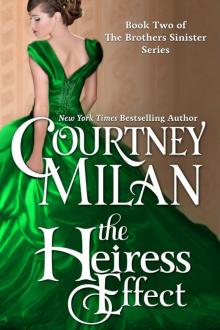 The Heiress Effect
The Heiress Effect Unraveled
Unraveled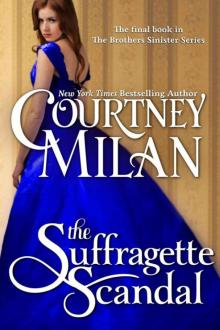 The Suffragette Scandal
The Suffragette Scandal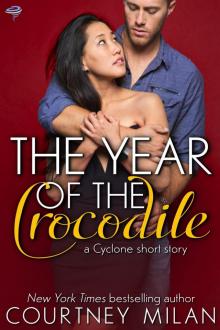 The Year of the Crocodile
The Year of the Crocodile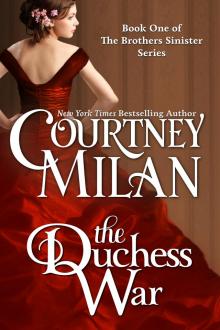 The Duchess War
The Duchess War What Happened at Midnight
What Happened at Midnight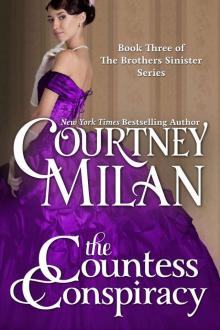 The Countess Conspiracy
The Countess Conspiracy Proof by Seduction
Proof by Seduction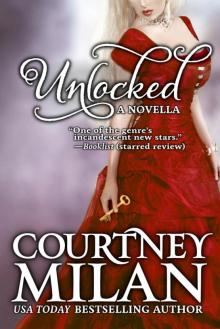 Unlocked
Unlocked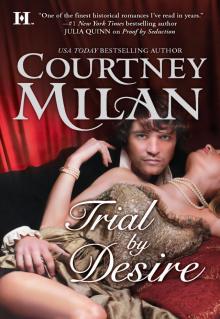 Trial by Desire
Trial by Desire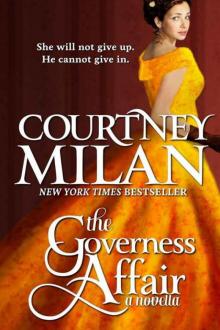 The Governess Affair
The Governess Affair Unveiled
Unveiled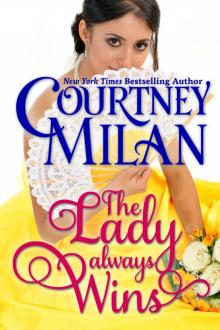 The Lady Always Wins
The Lady Always Wins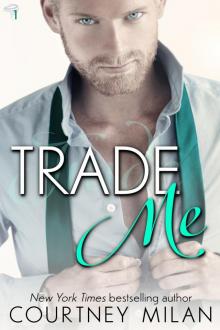 Trade Me
Trade Me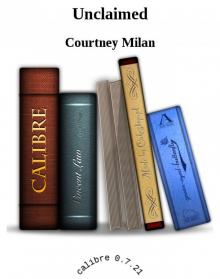 Unclaimed
Unclaimed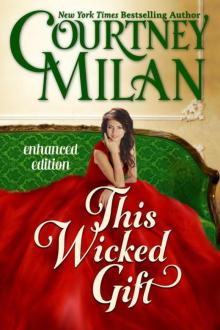 This Wicked Gift
This Wicked Gift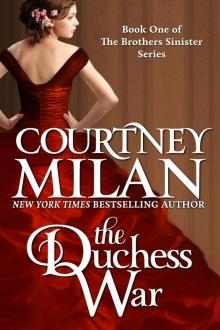 The Duchess War (The Brothers Sinister)
The Duchess War (The Brothers Sinister) Hamilton's Battalion: A Trio of Romances
Hamilton's Battalion: A Trio of Romances The Turner Series
The Turner Series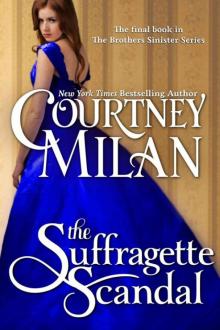 The Suffragette Scandal (The Brothers Sinister)
The Suffragette Scandal (The Brothers Sinister)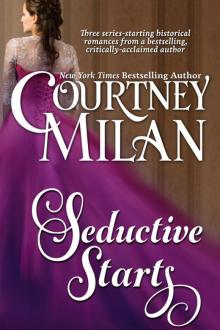 Seductive Starts
Seductive Starts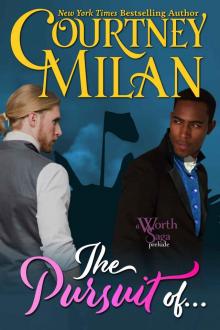 The Pursuit Of…
The Pursuit Of… Hamilton's Battalion
Hamilton's Battalion The Carhart Series
The Carhart Series Seven Wicked Nights
Seven Wicked Nights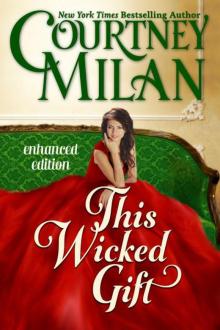 This Wicked Gift (A Carhart Series Novella)
This Wicked Gift (A Carhart Series Novella)